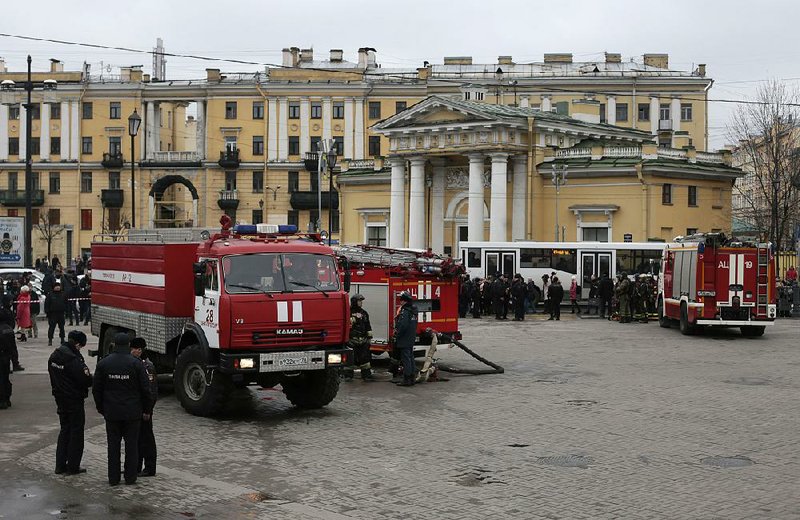ST. PETERSBURG, Russia -- A bomb blast tore through a subway train deep under Russia's second-largest city Monday, killing 11 people and wounding about 40 in a chaotic scene that left victims sprawled on a smoky platform. Hours later, police found and defused a shrapnel-packed explosive device at another St. Petersburg station.
There was no immediate claim of responsibility for the attack, which came while President Vladimir Putin was visiting the city, his hometown. In the past two decades, Russian trains and planes have been frequent targets of terrorism, usually blamed on Islamic militants.
News reports initially said police were searching for two suspects, and Russian state television showed a photo of one suspect wearing what appeared to be a skullcap characteristic of Russia's Muslim regions. However, the Interfax news agency later cited unspecified sources as saying police now suspect the blast was the work of a single Islamist-linked suicide bomber, who left an explosive device at one central station before boarding a train and detonating a second device.
The Investigative Committee, the country's top criminal investigation body, said it had begun a probe based on the assumption that the attack was terrorism, but added that other possibilities were being considered.
St. Petersburg, a major tourist destination famed for its imperial palaces and lavish art museums, had been spared previous attacks.
"From now on, I will be scared to take the subway," said Marina Ilyina, 30, who took flowers to the station where the train stopped after the bombing. "We in St. Petersburg thought we wouldn't be touched by that."
The explosion occurred in midafternoon as the train traveled between stations on one of the city's north-south lines.
The driver chose to continue on to the next stop, Technological Institute, a decision praised by the Investigative Committee as aiding evacuation efforts and reducing the danger to passengers.
The National Anti-Terrorism Committee said the death toll was 11, with another 45 people being treated for wounds in hospitals.
Russia's health minister, Veronika Skvortsova, said seven people died at the scene, one died en route to the hospital and two more while undergoing treatment. She said six people remained in serious condition, raising the possibility that the death toll could rise. Authorities later said an 11th person had died.
Andrei Przhezdomsky, spokesman for the National Anti-Terrorism Committee, said the blast was caused by "an unidentified explosive device" in one of the cars as the train traveled from Sennaya Square station, one of the main interchanges of the city's subway system, at about 2:40 p.m.
Amateur video broadcast by Russian TV showed people lying on the platform of the Technological Institute station, and others bleeding and weeping just after the damaged train pulled in.
"Everything was covered in smoke. There were a lot of firefighters," Maria Smirnova, a student on a train behind the stricken one, told independent TV station Dozhd.
Security forces fanned out on extra patrols as police helicopters crisscrossed overhead in one of the city's most celebrated, and tourist-visited, neighborhoods. The area around the Sennaya Square station is near some of the most famous sights of St. Petersburg, and was the setting of Fyodor Dostoevsky's novel Crime and Punishment.
Within two hours of the blast, authorities had found and deactivated another bomb at another busy station, Vosstaniya Square, the anti-terror agency said. That station is a major transfer point for passengers on two lines and serves the railway station to Moscow.
Russian law enforcement agencies confirmed the device was loaded with shrapnel, and the Interfax news agency said it contained up to 2.2 pounds of explosives.
The entire St. Petersburg subway system was shut down and evacuated, but partial service resumed after about six hours.
Security was immediately tightened at all of the country's key transportation sites, the National Anti-Terrorist Committee said. Moscow officials said that included the subway in the Russian capital.
Putin, who was meeting with the president of Belarus at the Constantine Palace on the city's outskirts, offered condolences on national television.
"Law enforcement agencies and intelligence services are doing their best to establish the cause and give a full picture of what happened," a somber-looking Putin said.
He later laid flowers outside the Technological Institute station.
Some residents of St. Petersburg, a city of 5 million, responded with both dismay and determination.
"They won't succeed in breaking up our country. We are all citizens of one country despite various political views and religious beliefs," said 24-year-old Alexander Malikov, who brought flowers and candles to an improvised memorial outside one of the stations.
In Moscow, dozens of young people gathered outside the Kremlin to lay flowers at a World War II memorial to the city of Leningrad, St. Petersburg's name at the time.
The city of St. Petersburg announced three days of mourning beginning today.
The bombing drew widespread condemnation.
President Donald Trump said it was "absolutely a terrible thing." White House Press Secretary Sean Spicer said the U.S. was prepared to offer assistance to Russia.
The Kremlin later said Trump had called Putin to offer condolences over the attack.
Lebanon's militant Hezbollah group, which is backing Syrian President Bashar Assad's forces along with Russia, says the incident was the type of "terrorism" Russia was fighting in Syria.
The U.N. Security Council condemned "in the strongest terms the barbaric and cowardly terrorist attack."
Council members "expressed their deep sympathy and condolences to the victims of this heinous act of terrorism and to their families, and to the people and to the Government of the Russian Federation," a statement said, adding that the "perpetrators, organizers, financiers and sponsors of these reprehensible acts" should be brought to justice.
Information for this article was contributed by Irina Titova, Jim Heintz, Vladimir Isachenkov and Nataliya Vasilyeva of The Associated Press and by Andrew Roth, David Filipov and Brian Murphy of The Washington Post.
A Section on 04/04/2017
